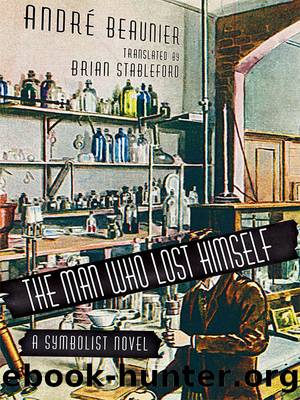The Man Who Lost Himself by André Beaunier & translated by Brian Stableford

Author:André Beaunier & translated by Brian Stableford
Language: eng
Format: epub
Tags: European science fiction, French science fiction, symbolist fiction, classic, literature
ISBN: 9781434447067
Publisher: Wildside Press LLC
Published: 2013-02-28T00:00:00+00:00
CHAPTER THREE
Michel Bedée arrived in Holland at daybreak. The Alchemist was with him.
When the Alchemist had asked him, at the moment of departure, exactly where he was going, he had felt bewildered, as if he were at a crossroads where all the roads in the world intersected, and he had no preference for any of them. But the Alchemist had said to him: âWhat if you were to go to Spinozaâs homeland? The man who was able to vanquish life and be alone could teach you about solitude.â
So Michel had decided to go to Holland. He thought: Why should I be in one place rather than another from now on? God, who renounced choice, is everywhereâand we, in uncertainty, ought to be nowhere. So, in the meantime, what does it matter?
The name of Spinoza, which the Alchemist had dropped into his train of thought, caused a considerable stir of ideas there.
In Rijnsburg, when he had been chased out of Amsterdam by the rancor of people and the deceptive love of a woman, in a bleak landscape, Spinoza was nowhere. And nowhere is where Iâm going....
Michel was in a sort of quietude, a condition of resistance against the sharp temptation of tears that were rising to his eyes; at the same time, his ears were buzzing, his head was filled with a bizarre seethingâbut he mastered it, and the attentive effort of his will kept him busy.
Facing him, lying on a banquette, the Alchemist was asleepâsleeping well, like an honest man whose hour has come.
Dawn came stealthily.
Through the windows of the carriage, Michel watched it. First there were a few tufts of cloud that became paler; then, in the intervals between them, silver light appeared. Then, there was a profound liberation of the heavens, which brightened; the clouds became darker. They passed a file of trees, still black. The light was freed when the meadows manifested their verdure, under the shadows and the mist, but it was sad and confused. There was no explosion, but a slow transformation, devoid of episodes. The progress was imperceptible. Michelâs eyes grew tired trying to discern the nuances and their metamorphoses. Besides which, his back was so weary and his legs so heavy that he scarcely dared change position in order to get a better view.
In The Hague, they went to see Spinozaâs tomb.
It is in the New Church, vast, square and ugly. They were guided by a good woman who only spoke Dutch. She said a great deal, but from all her chatter, Michel only retained the smiling familiarity with which the old woman supported the proximity of a poignant tomb. She led them between chairs and pews; she took them to the pulpit into which the pastor climbed, every Sunday, in order to affirm the superiority of Calvinism to his flock. Facing it, she pointed out a platform to which the young queen came, willingly, to learn more about Calvinism and its superiority.
When they asked for the tomb of Spinoza, the good woman
Download
This site does not store any files on its server. We only index and link to content provided by other sites. Please contact the content providers to delete copyright contents if any and email us, we'll remove relevant links or contents immediately.
Evelina by Fanny Burney(25996)
Evelina, Or, the History of a Young Lady's Entrance into the World by Fanny Burney(25769)
Twilight of the Idols With the Antichrist and Ecce Homo by Friedrich Nietzsche(17748)
Pale Blue Dot by Carl Sagan(4050)
Dune 01 Dune by Frank Herbert(3861)
The Perks of Being a Wallflower by Stephen Chbosky(3856)
Man and His Symbols by Carl Gustav Jung(3352)
Double Down (Diary of a Wimpy Kid Book 11) by Jeff Kinney(3312)
Separate Beds by LaVyrle Spencer(3295)
Walking by Henry David Thoreau(3259)
FOUNDATION AND EMPIRE by Isaac Asimov(3199)
The 101 Dalmatians by Dodie Smith(2963)
Anna and the French Kiss by Stephanie Perkins(2913)
Ficciones by Jorge Luis Borges(2894)
Mystery at School by Laura Lee Hope(2840)
120 Days of Sodom by Marquis de Sade(2467)
Some Prefer Nettles by Tanizaki Junichiro(2466)
The Little Prince by Antoine de Saint-Exupéry(2369)
My Ántonia by Willa Cather(2353)
